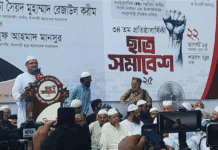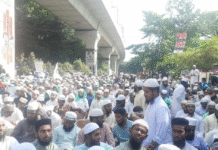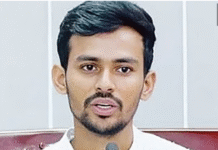
Bangladesh prime minister Sheikh Hasina said on Sunday that the government could do nothing to reform the quota system in public services until the court resolved the matter.
‘The executive authority has nothing to do right now when the higher court or the court passes a judgement. The issue will have to be solved at the court,’ she said at a press conference at her official residence, Ganabhaban.
The press conference was arranged to discuss the outcome of her recent visit to China.
Addressing the quota protesters, she remarked that those leading the movement ‘do not adhere to laws, do not respect the court, do not understand the constitution, or comprehend governmental operations.’
‘Why so much anger against the liberation war and freedom fighters? The grandchildren of the freedom fighters will not get [quota]? So will Razakar’s grandchildren get it? My question is to the country people,’ she said.
‘Then will Razakar’s grandchildren get jobs, not freedom fighters. What is the crime [of freedom fighters]? By risking their lives, they threw away everything and took part in the liberation war. They brought victory to this country by fighting day and night without eating, walking on mud, facing the sun, rain, and storms. Everyone is sitting in high position because they brought victory,’ she said.
Hasina, also the president of the ruling Awami League, noted that the court had provided the protesters with the opportunity to present their arguments in a legal setting, but they preferred to resolve the matter through street protests.
‘We have nothing to do here until it is solved in court. That is the reality,’ she said.
The prime minister also warned protesters that destructive activities in the name of protests would not be tolerated.
‘If they engage in activities like attacking police and vandalising vehicles, the law will take its own course,’ the PM said.
The prime minister said that her government abolished the quota system for government jobs following the 2018 movement to see its consequences.
‘Once such a movement was made in 2018, not only the movement, they carried out attacks on the Awami League office and on people. I got fed up after seeing them and said, Ok, I was dropping the quota,’ she said.
Citing that females also joined the 2018 anti-quota movement, she said that only two women in the last BCS examination qualified for foreign services and four for police cadre.
Defending the district-based quota system in government jobs and for the marginalised community, she said that some districts were getting deprived due to the abolishment of the quota system.
‘Not a single person got a job in police services from 23 districts in an examination,’ she said.
The marginalised community also has the right to get jobs, she went on.
About the ongoing teachers’ movement against the national pension scheme, the PM said that the protesting teachers had some confusion about the pension account.
She said, by showing a file on her desk, that she had kept notes on these and already informed the teachers about them.
‘Still they are continuing the strike, and so be it,’ she said, adding, ‘let them become tired, then I will say something,’ she said.
PM termed the criticism over her recent bilateral tours as a ‘mental illness.’
‘Those who speak, let them speak. I don’t care here,’ she said.
‘I think it is a kind of mental illness. No one can tell lies without mental illness. I feel sorry for them. There is nothing to say about them,’ she said.
She said that during her China visit, Chinese president Xi Jinping mentioned four areas of assistance in grants, interest-free loans, concessional loans, and commercial loans, at the bilateral meeting on July 10.
‘Under these four packages, China has agreed to pay the equivalent of $2 billion to Bangladesh,’ she said.
The PM said that she believed that Bangladesh and China would continue to advance development through mutual assistance, considering global realities like climate change, the Palestine crisis, human rights, sustainable development, and the United Nations.
At the press conference, the PM said that no one would be spared if any link to corruption was found.
‘When I have started the drive, I will not spare corrupts, no matter who they are or what their positions are. I don’t even consider who is close (to me) or not. I must implement it as I have announced the zero-tolerance policy,’ she said.
She said one of her peons made Tk 400 crore through corruption, and she took action against him.
In an oblique reference to Nobel laureate Muhammad Yunus, the PM said the trial of some corruption cases has also been criticised, although the accused committed corruption and misappropriated the money of workers.
Replying to a question, the PM said that she preferred India to complete the Teesta project as Bangladesh has problems with India over sharing the water of this river.
‘They (India) will give us whatever we need after completion of the Teesta project,’ she said.
The prime minister said that both China and India have given proposals for implementing the Teesta project, and they would conduct feasibility studies separately.
‘We will go for the proposal that is suitable for us after seeing their feasibility studies,’ she said.
New Age









